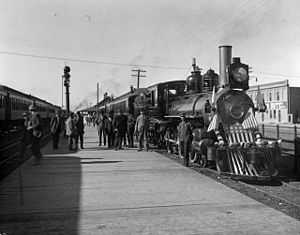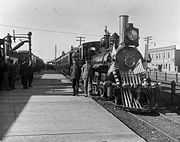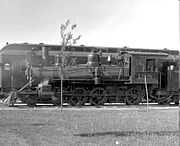D&RGW 168
| Denver and Rio Grande Western No. 168 | |
|---|---|
|
168 at the head of a special train taking William Howard Taft to the opening of the Gunnison Tunnel, 1909 | |
| Type and origin | |
| Reference [1][2][3] | |
| Power type | Steam |
| Builder | Baldwin Locomotive Works |
| Serial number | 6670 |
| Build date | 1883 |
| Specifications | |
| Configuration | 4-6-0 |
| UIC classification | 2′C n2 |
| Gauge | 3 ft (914 mm) |
| Driver diameter | 46 in (1,168 mm) |
| Length | 53.3 ft (16.2 m) |
| Weight on drivers | 50,643 lb (23.0 t) |
| Locomotive weight | 70,550 lb (32.0 t) |
| Locomotive and tender combined weight | 117,950 lb (54 t) |
| Fuel type | Coal |
| Boiler pressure | 160 psi (1 MPa) |
| Cylinders | Two |
| Cylinder size | 14 in × 20 in (356 mm × 508 mm) |
| Performance figures | |
| Tractive effort | 11,590 lbf (51.55 kN) |
| Career | |
| Operator(s) | D&RG » D&RGW |
| Class |
D&RG: 47, DRGW: T-12 |
| Number(s) | D&RGW: 168 |
| Retired | 1938 |
| Current owner | City of Colorado Springs |
| Disposition |
Static Display |
|
Rio Grande Engine No. 168 | |
 | |
| Location | 9 S. Sierra Madre, Colorado Springs, Colorado |
| Coordinates | 38°50′3.4″N 104°49′41″W / 38.834278°N 104.82806°WCoordinates: 38°50′3.4″N 104°49′41″W / 38.834278°N 104.82806°W |
| Area | less than one acre |
| Built | 1883 |
| Architect | Baldwin Locomotive Works |
| Governing body | Local |
| NRHP Reference # | 79000601[4] |
| Added to NRHP | August 10, 1979 |
Denver and Rio Grande Western No. 168 is a 4-6-0, Ten Wheeler type, narrow gauge steam railway locomotive. It is one of twelve similar locomotives built for the Denver and Rio Grande Railroad by Baldwin Locomotive Works in 1883. It was built as a passenger locomotive, with 46 in (1,200 mm) drivers, the largest drivers used on any three foot gauge D&RGW locomotive. The large drivers made it suitable for relatively fast passenger service.
As is the case with many small, early locomotives, we know little of their operating history. In the case of 168, what we know comes entirely from photographs taken of it. The first shows it in the Black Canyon of the Gunnison River in 1904. The second pair show it in Montrose, Colorado, west of Gunnison, at the head of a special train taking President William Howard Taft to the opening of the Gunnison Tunnel which, at the time, was the longest irrigation tunnel in the world. There are also photographs, taken by Otto Perry, showing it in Alamosa in 1923 and Salida in 1929. It was retired in 1938, later than most of its class.
The railroad gave it to the City of Colorado Springs on August 1, 1938. It was added to the National Register of Historic Places as Rio Grande Engine No. 168 in 1979.[4] Although it sits in Antlers Park, unprotected from the elements, behind a low fence, it appears to be in immaculate cosmetic condition.
|
See also
References
- ↑ Official Roster No. 11 of the Denver and Rio Grande Western Railroad System. Denver: The Denver and Rio Grande Western Railroad System. April 1, 1923.
- ↑ Presentation Ceremony Program. Denver and Rio Grande Western Railroad. August 1, 1938.
- ↑ "Denver & Rio Grande Locomotive History: 168". Rio Grande Modeling and Historical Society. Retrieved 28 January 2010.
- ↑ 4.0 4.1 "National Register Information System". National Register of Historic Places. National Park Service. 2009-03-13.
| ||||||||||||||||||||||||||



